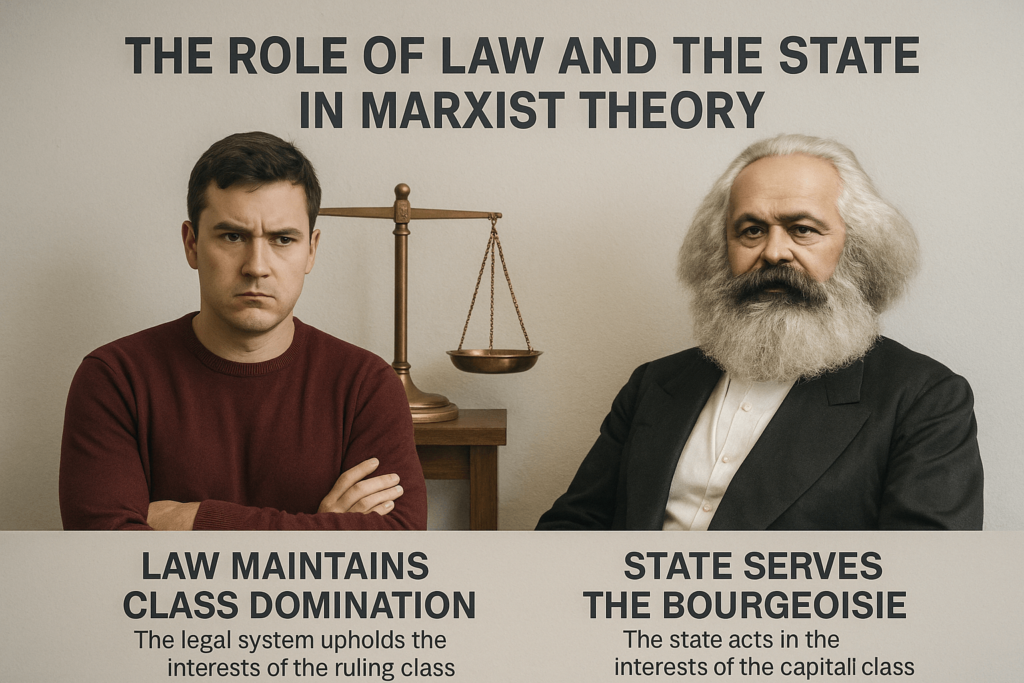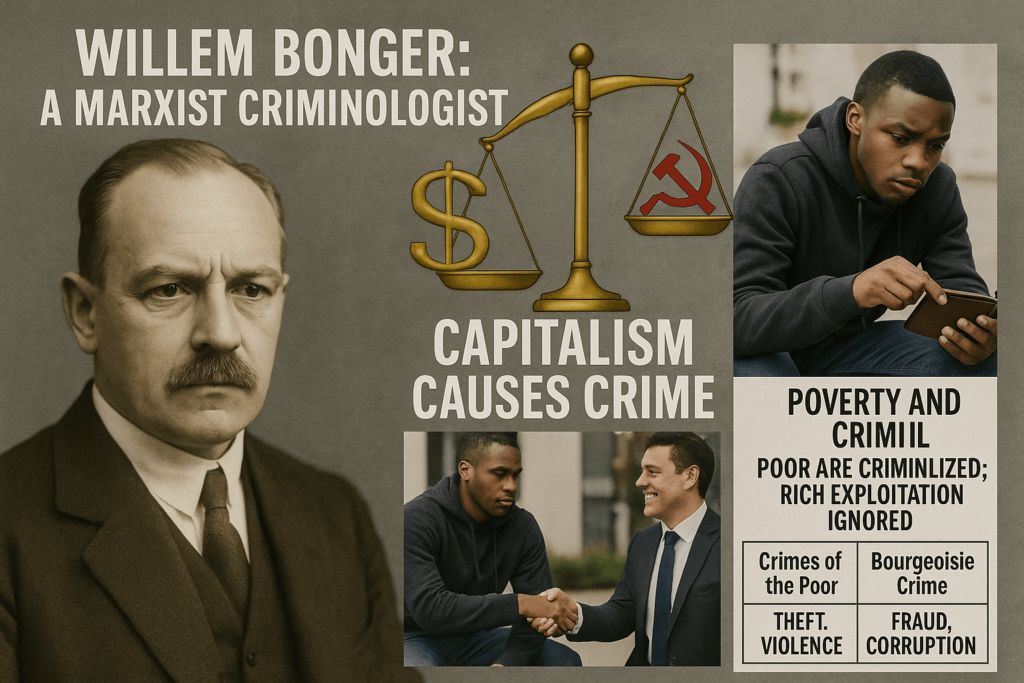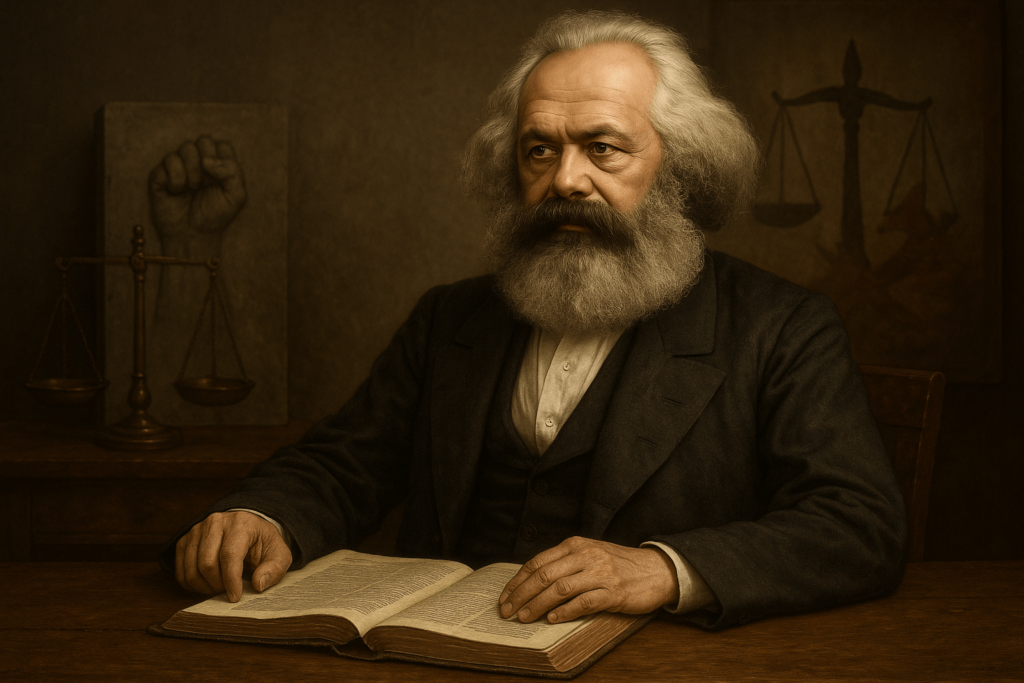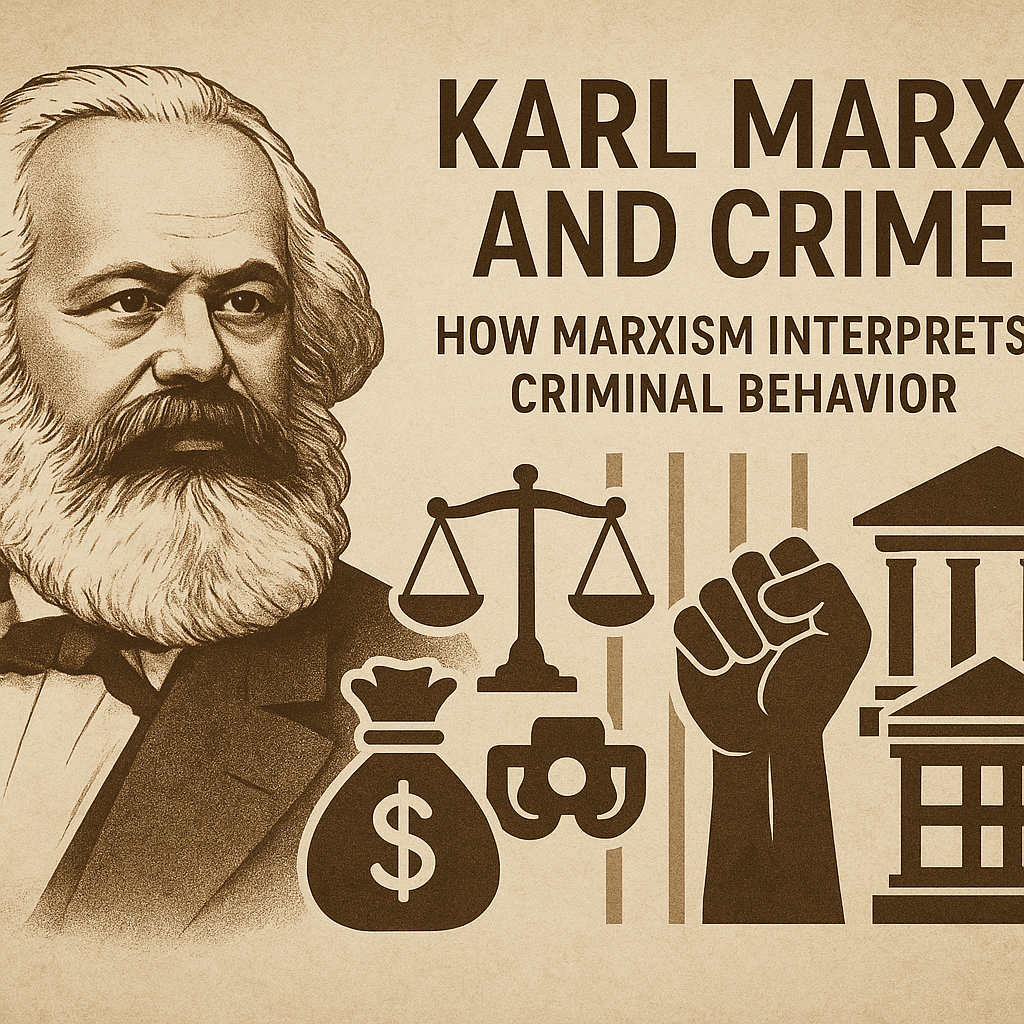Introduction: Marxist criminology
Karl Marx, the renowned German philosopher and economist, was not a criminologist in the traditional sense. However, his ideas about economics, class control, and social conflict provide a profound analytical framework for understanding criminal behavior. Marxism, as a critical theory of capitalism, offers one of the most influential perspectives on interpreting crime—not as a result of deviant individual behavior, but as a product of an unjust socio-economic structure. This article explores how Marxist theory interprets crime from a structural perspective, connecting it with class conflict, law, the state, and mechanisms of social control.
1. Understanding Marxism: The Core Concepts
To grasp how Marxism interprets crime, we must first understand the core concepts upon which this ideology is built:
– Historical Materialism
Marxism posits that history is shaped by material conditions and relations of production, not abstract ideals. Laws and moral norms, in this context, are seen as outcomes of the material and economic base—they are not eternal or neutral. Thus, crime is not an independent moral failing but a reflection of economic structures.
– Class Struggle
At the heart of Marxist thought lies the notion of class struggle. In capitalist societies, there is a division between the bourgeoisie (owners of the means of production) and the proletariat (those who sell their labor). Crime, from this perspective, is a product of this struggle—either as a form of resistance (such as theft from the wealthy) or as a consequence of systemic deprivation.
– Base and Superstructure
Marx argued that the economic base (infrastructure) shapes the political, legal, religious, and cultural superstructure. This implies that criminal laws are not impartial but are created and enforced in ways that serve the economic interests of the ruling class.
– Ideology
Dominant ideologies in society are crafted by the ruling class to present their interests as universal. This includes the very definition of “crime.” Poverty caused by capitalism is framed as individual failure, while the harmful actions of corporations are often overlooked. The legal system thus becomes a tool to maintain capitalist order.
2. Capitalism and Crime: A Structural Perspective
Marxist theory views crime not as deviance, but as a rational response to the dysfunctions of capitalist society:
– Class Inequality and Structural Poverty
Capitalism inherently produces class disparities. A minority accumulates wealth while the majority endures poverty, unemployment, and insecurity. Under these conditions, crime can become a survival mechanism. Theft or drug dealing, for example, often arise not from immorality, but from desperate economic need.
– Consumer Culture and Relative Deprivation
Capitalist societies promote excessive consumption through advertising, creating desires that the poor cannot fulfill through legitimate means. This tension between societal expectations and limited means leads to “relative deprivation,” which drives some individuals toward criminal actions.
– Social and Psychological Alienation
Marx argued that workers under capitalism experience alienation—from their labor, from society, and from themselves. This alienation breeds apathy, aggression, and sometimes resentment, which may manifest in criminal behavior. Crime here becomes an unconscious protest against the dehumanizing system.
– Repression and Lack of Protection
The poor are often subjected to heavy policing but lack real protection from economic exploitation or systemic abuse. Laws are harsh on petty crimes yet lenient on corporate misconduct or political corruption—highlighting the biased nature of the justice system.
3. The Role of Law and the State in Marxist Theory
From a Marxist standpoint, the law is not neutral. Rather, it serves as a tool for the ruling class to maintain control:
– Law as an Instrument of Class Domination
Laws are written and interpreted to protect the interests of the economically powerful. For instance, laws harshly punish trespassing on private property but are more lenient on acts that harm the working class. The law is designed to discipline the poor rather than address their suffering.
– Class-Based Criminalization
Behaviors common among the poor—such as loitering or low-level drug use—are often criminalized, while corporate crimes like tax evasion or financial fraud are under-enforced. This discrepancy reveals the class bias inherent in defining and prosecuting crime.
– Selective Enforcement
The law is not applied equally. It is used to target specific groups such as workers, minorities, and immigrants, thereby preserving the existing class order. Prisons, in this light, serve not just as punishment but as instruments of social control.
– The Myth of Legal Neutrality
While the legal system claims impartiality, it in fact mirrors the values and interests of the ruling class. Police, courts, and prisons do not simply enforce justice—they maintain capitalist stability and suppress dissent.

4. Willem Bonger: A Marxist Criminologist
Willem Bonger, a Dutch sociologist influenced by Marx, was one of the first to explicitly connect economic structures with criminal behavior in his 1916 book “Criminality and Economic Conditions.”
– Bonger’s Key Ideas
- He argued that capitalism fosters selfishness and weakens social bonds, leading to increased crime.
- He maintained that crime is not rooted in human nature but in oppressive socio-economic conditions.
- He emphasized how criminal law is selectively enforced against the poor while protecting the wealthy.
– Bonger’s Legacy in Criminology
Bonger laid the groundwork for the “critical criminology” movement, which gained prominence in the 20th century. His work inspired contemporary theorists to explore crime within its broader class and cultural context.

5. Contemporary Marxist Criminology
Marxist thought in criminology has evolved to include cultural and critical analyses, giving rise to several key schools:
– Neo-Marxism and Cultural Analysis
Neo-Marxists drew upon Antonio Gramsci’s concept of hegemony to explain how capitalist dominance is maintained through consent, not just force. Crime is not only a product of poverty but also of cultural marginalization and symbolic exclusion.
– The New Criminology (1973)
Taylor, Walton, and Young’s landmark book “The New Criminology” called for a comprehensive theory of crime that includes analysis of the act itself, societal reactions, and power structures. They advocated for integrating criminology with radical social change.
– Left Realism
Emerging in the 1980s, left realism criticized traditional Marxist criminology for ignoring the real suffering of crime victims, especially in poor communities. It emphasized practical solutions—like community policing and social reforms—while maintaining a critical stance toward capitalism.
– Globalization and Crime
Modern Marxist criminologists examine how neoliberal globalization produces new forms of crime, such as human trafficking, environmental destruction, and corporate corruption. Global capitalism is seen as a system that criminalizes the powerless while shielding elite wrongdoing.
Marx and Criminology
An In-Depth Exploration of How Karl Marx’s Theories Illuminate the Structural Roots of Crime, Reveal the Class-Based Nature of Legal Systems, and Inspire the Foundations of the Socialist School of Criminology
The relationship between Karl Marx’s socio-economic theories and the field of criminology represents a pivotal intersection in the understanding of crime, justice, and power. Marx, who critically examined the dynamics of capitalism, class struggle, and social inequality, laid the intellectual groundwork for a criminological approach that views crime not as an isolated moral failing or personal choice, but as a symptom of deeper structural imbalances in capitalist societies. Through the lens of Marxist criminology, scholars have argued that legal systems are inherently biased in favor of the ruling bourgeoisie, using the law as a tool to maintain dominance, protect private property, and criminalize the survival strategies of the oppressed working class. This interpretation challenges mainstream criminological theories by asserting that crime is often a rational response to poverty, alienation, and marginalization.
Furthermore, Marx’s analysis influenced later thinkers like Willem Bonger and Richard Quinney, who expanded on the idea that crime is socially constructed and politically enforced to reinforce capitalist ideologies. These insights became central to the development of the socialist school of criminology, which advocates for a complete rethinking of how justice is defined and administered. This school emphasizes the need to dismantle the exploitative economic relations at the heart of capitalist society and to build a system rooted in equality, social welfare, and collective responsibility. In this context, criminology transforms from a discipline focused on control and punishment into one committed to social liberation, justice, and the eradication of systemic harm. By integrating Marxist perspectives, criminologists are better equipped to expose the ideological underpinnings of law, challenge the myth of neutral justice, and seek transformative alternatives that address crime at its very roots.
Marx and Criminology: A Critical Examination of Class, Power, and Justice through the Lens of Socialist Thought
The integration of Karl Marx’s ideas into the field of criminology marked a transformative moment in how crime, justice, and legality are interpreted in capitalist societies. Marxist criminology stands not as a fringe theory but as a fundamental critique of how modern legal and penal systems operate under the influence of class interests and economic power. This section aims to explore the theoretical foundation laid by Marx, how it shaped the direction of critical criminology, and how it ultimately contributed to the development of the socialist school of criminology.
1. Foundations of Marxist Theory in Criminology
Karl Marx’s historical materialism emphasized that material conditions and economic relations shape all social structures—including law and justice. Crime, from this perspective, is not an individual anomaly but a product of socioeconomic inequality. The capitalist system, driven by profit and private ownership, inevitably creates class divisions, leading to the marginalization of the working class. As a result, behaviors associated with poverty or resistance are often criminalized, while acts of exploitation by the ruling class are legitimized through law.
This theory laid the groundwork for scholars like Willem Bonger, who argued that capitalism promotes egoism and competition, which in turn encourage criminal behavior. The law, rather than being neutral, reflects the moral code of the economically dominant class. It protects wealth, not people.
2. The Role of the State and Law in Capitalist Societies
According to Marxist theory, the state functions as an instrument of the bourgeoisie, designed to maintain their control over the means of production and, by extension, over society. The legal system, including criminal law, serves this function by regulating behavior in a way that preserves existing power structures. Thus, crimes committed by the poor—such as theft or drug-related offenses—are heavily penalized, while corporate crimes, environmental destruction, or financial frauds often go unpunished or are treated lightly.
This disparity is not incidental but systemic. It shows that the justice system in capitalist societies often does not aim to achieve true justice, but rather to maintain order favorable to those in power.
3. Crime as a Reflection of Structural Inequality
Marxist criminologists argue that high crime rates in poor communities are not simply due to moral failure or lack of education, but are deeply rooted in deprivation, unemployment, alienation, and lack of access to social resources. Capitalism creates conditions in which people must sometimes resort to illegal activities simply to survive.
Moreover, Marxist theory challenges the notion of “free will” in committing crimes. When individuals are born into environments that limit their life chances, their choices are heavily constrained. This is in sharp contrast to classical criminological theories that view crime as a rational, individual choice.
4. The Emergence of the Socialist School of Criminology
From the foundations laid by Marx, a distinct school of thought emerged—the socialist school of criminology. This school goes beyond critique and proposes alternatives rooted in equity, collective responsibility, and social welfare. Socialist criminologists argue for a system that does not just punish but seeks to eliminate the root causes of crime, such as poverty, exploitation, and discrimination.
Under socialist models, crime prevention is closely tied to social reform. Education, healthcare, housing, and employment are viewed as essential components in reducing crime. In such systems, the emphasis shifts from retribution to rehabilitation, from exclusion to reintegration, and from protection of property to protection of people.
5. Contemporary Relevance of Marxist Criminology
Today, as global inequality reaches unprecedented levels and justice systems are increasingly scrutinized for racial and class biases, Marxist criminology has regained relevance. Movements advocating for prison abolition, restorative justice, and economic justice all echo Marxist concerns about structural inequality and systemic oppression.
In academic discourse, Marxist criminology offers a counter-narrative to dominant perspectives that often pathologize the poor while ignoring the systemic violence of capitalism itself. It calls us to rethink what we define as crime and justice, and who has the power to define them.
6. Toward a Radical Redefinition of Justice
By combining theoretical analysis with political commitment, Marxist and socialist criminology demand a radical redefinition of justice—one that goes beyond punishment and deterrence. Justice, in this view, cannot be separated from social and economic democracy.
A truly just society is one in which no one is forced into crime by circumstances, and where laws serve the people—not just the elite. It is a society that recognizes how systemic injustice produces individual offenses, and that only through structural change can crime truly be reduced.
Conclusion: Marx’s Enduring Legacy in Criminology
Marxism provides a powerful lens for understanding crime as a consequence of socioeconomic injustice. Rather than viewing crime as an isolated moral failing, Marxist theory situates it within the larger framework of class relations, economic structures, and state power. The legal and penal systems, far from being neutral, are exposed as tools of capitalist control. In an era of rising inequality and global crises, Marxist criminology remains essential—not only for diagnosing the roots of crime but also for envisioning a more just and humane world.
The Socialist School of Criminology extends the Marxist analysis of crime by emphasizing the role of socialism as an alternative to capitalist structures that generate crime. This school argues that true social justice and the elimination of crime can only be achieved through the establishment of a socialist society, where economic inequality is abolished, and social resources are distributed equitably. The Socialist School critiques not only the capitalist legal system but also calls for a complete transformation of social institutions, including law enforcement and the justice system, to serve the interests of the working class and marginalized populations. By focusing on collective welfare rather than individual punishment, this school envisions a society where crime diminishes as social conditions improve and systemic oppression is dismantled.

References
- Marxist Criminology – A comprehensive overview of the Marxist perspective in criminology.
🔗 https://en.wikipedia.org/wiki/Marxist_criminology - Marx and the Basis of Critical Criminology – Educational explanation of how Marx influenced modern critical criminology.
🔗 https://kpu.pressbooks.pub/introcrim/chapter/10-2-marx-and-the-basis-of-critical-criminology/ - Marxism and Criminology: A History of Criminal Selectivity – Historical analysis of Marxist criminology and criminal justice.
🔗 https://academic.oup.com/bjc/article-abstract/58/4/1020/4951250 - Socialist School of Criminology: Theoretical Foundations and Critiques – An in-depth exploration of socialist criminology theories.
🔗 https://www.crimpsy.com/socialist-school-of-criminology-theoretical-foundations-and-critiques/ - Crime, Justice, and Socialist Construction – Comparison between capitalist and socialist justice systems.
🔗 https://ojp.gov/ncjrs/virtual-library/abstracts/crime-justice-and-socialist-construction-crime-and-criminal-justice - Socialist Criminology – Theoretical and Methodical Foundations – A classical resource on East German criminology.
🔗 https://www.ojp.gov/ncjrs/virtual-library/abstracts/socialist-criminology-theoretical-and-methodical-foundations - Crime and Capitalism: Readings in Marxist Criminology – A collection of classic readings exploring crime through a Marxist lens.
🔗 https://www.jstor.org/stable/j.ctt14btbrw - Marx and Criminology – Research article discussing Marx and Engels’ contributions to crime theory.
🔗 https://www.researchgate.net/publication/268083600_Marx_and_criminology - Rethinking a Marxist Theory of Crime and Punishment – Revisiting Marxist theory with an open Marxism perspective.
🔗 https://warwick.ac.uk/fac/cross_fac/iatl/research/reinvention/archive/launchissue/paper4/

